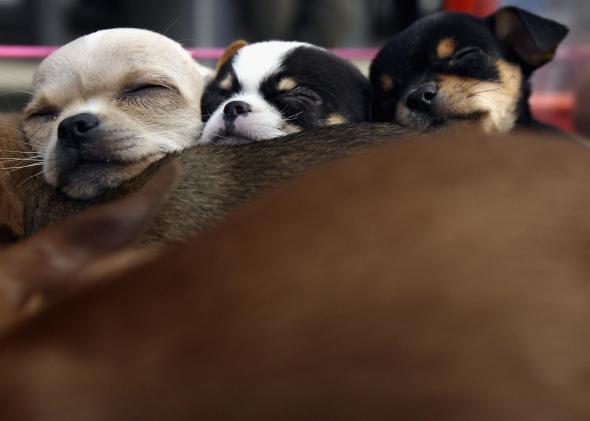There are times when describing something as cute just isn’t. For example, when appraising a seminar classmate’s argument with the adjective, as a friend once did—especially when you are a man and she is a woman. My well-intentioned pal had meant cute as a compliment; he says he found his colleague’s take neat and pleasing. But he knew the second he said it that he’d screwed up. Even before his co-students excoriated him for sexism and condescension, he knew. But he maintains that his word choice, at least by his meaning, was appropriate. Did he deserve the public drumming?
Cute’s history argues for leniency. When the word first appeared in English in 1731, it was a shortened form of acute, the adjective meaning “shrewd,” “keen,” or “clever.” It even had its own opening apostrophe—‘cute—to let you know it had been clipped. (Whether all abbreviations are somewhat cute, as in “heartwarmingly diminutive,” is a question for minds cuter, as in “more cunning,” than mine.) A “cute remark” back in Victorian England was a quick-witted one. So was the “cute man” in Dickens’ 1841 book Barnaby Rudge. And so was a cute girl. In 1882, the Manchester Evening Mail ran a piece defending the typical American young woman as being just “as cute as the masculine Yankee,” by which it meant she was equally sharp and spirited.
You can thank American school kids for the more familiar “attractive,” “pretty,” or “charming” evolution of the term. This confusion of physical and mental appreciation—from the shapeliness or comeliness of a line of thinking to the elegant cut on a garment—misled my friend, who wanted to praise an argument on its brainy merits, into dinging it as trivial and superficial. Once cute’s slang meaning caught on in the mid 1830s, it was used to describe, among other things, small socks, a nice, orderly study room, the narrow and beautiful vasculature of old city streets, and “a French accent … reminiscent of the naughty-naughty twitterings of a Parisian miss on the English musical comedy stage.” Maybe that same bus that shuttles the modifier “smart” between ideas and outfits helped cute migrate from an intellectual value system to an aesthetic one.
But in those early examples—the socks, the alleys, the young Parisian—yet another transformation is taking place. The smartness or “just-so”-ness of cute is also manifesting in the size of the noun being modified. In 1941, for instance, Aldous Huxley wrote of a “tiny boy … looking almost indecently cute in his claret-coloured doublet and starched ruff.”* I’m reminded of how Marianne Moore’s poetic ideal—“neatness of finish”—was occasionally misread as a sign of the smallness, the modesty, of her ambitions. Something about being neat and appropriate apparently translates into being tiny: There’s a sense of containment and easy comprehension. By the time Boyz II Men were singing about their “cutie pie” and websites devoted to “cute little kittens” were springing up, cute had become a receptacle for all these related ideas: aesthetic charm, minuteness, childhood, femininity—with a lingering hint of wiliness thrown in for good measure.
So is it possible to praise a respected colleague’s work as “cute” today without minimizing it? The seminar argument in question was apparently neat and fun, which also means it didn’t seem messy, risky, or grandiose—it pleased my friend. Maybe there is something self-flattering about describing a comment in terms of its positive or negative effects on you. (And isn’t that one more funny thing about cute? It is almost less a quality you can assign to someone than a way of getting at how you feel in that person’s presence: warm and enamored and safe.) I think what I would have reacted badly to in that seminar is the way cute focuses on the unthreatening nature of the remark, stripping the student’s words—however charismatic, unexpected, or self-contained—of any power. Marrying the first definition of cute (ingenious) to the second (limited) results in a term for arguments that might surprise and delight you, but won’t change your mind.
Which was essentially how my friend felt. So I guess his use of cute was both apt and untactful, fitting and ugly. Cute, in other words, and very much not.
Correction, Feb. 27, 2015: This post originally cited Huxley’s 1941 quote to 1841.
